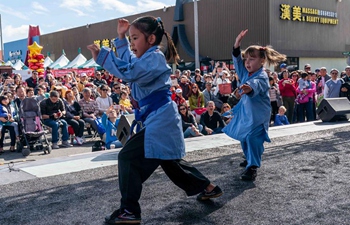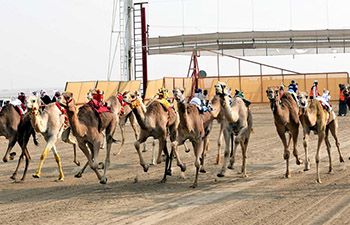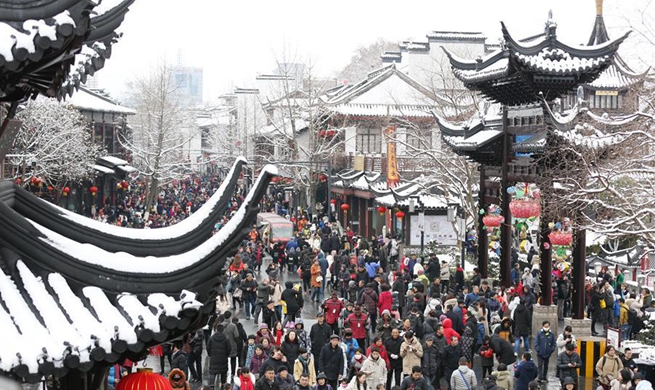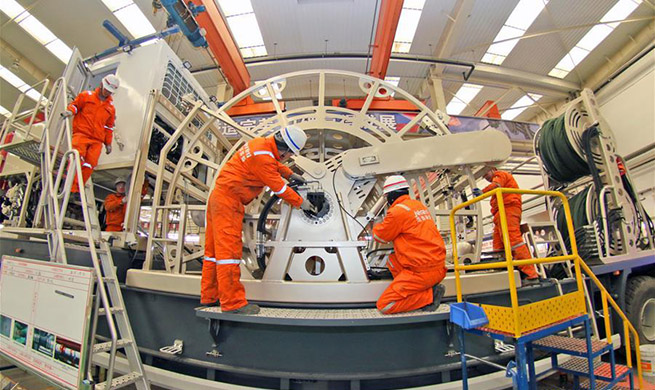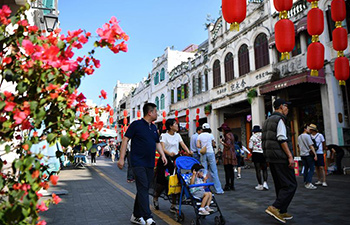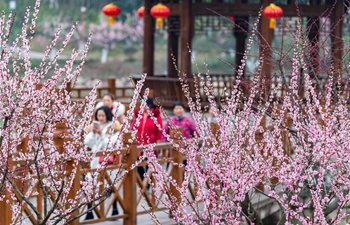NANNING, Feb. 11 (Xinhua) -- Tan Yongzhong's New Year resolution is to earn more money to buy more furniture and a new television.
Tan, 45, is a resident of Longbang Village in Tiandong County, in southern China's Guangxi Zhuang Autonomous Region. His family has just moved into a new house in the town nearby thanks to a government relocation program.
"I have found a job as a security guard nearby," he said. "My 3-year-old granddaughter is going to kindergarten in September this year. Looking back, it was hardly possible for us to pick her up for kindergarten when we lived in the village."
Villagers like Tan may have found their way out and moved into new homes in town, but things were totally different months ago when they still lived in Longbang Village.
The village is in the mountainous area in Tiandong County. All residents there are people of the ethnic Yao group. Due to harsh environmental conditions, residents there had long been impoverished.
"Back in Longbang Village, there were no roads, and even motorcycles could barely get through; most of the time we had to walk," Tan said. "There was no water, and we could only collect rainwater in storage containers for daily use."
Due to barren soil, there was limited farmland for crops. Villagers grew corn and beans in the cracks between the rocks.
The villagers were registered as poor households with less than 3,000 yuan (about 445 U.S. dollars) of per-capita income each year.
In recent years, the local government carried out a variety of measures to help locals fight poverty, including a relocation program.
In the new site of resettlement, workshops, schools, kindergartens and care centers have been established.
"The relocation program is the only way to change," said Huang Bingbang, a village official. "People simply could not survive in an inhospitable area like Longbang Village."
Lu Xingai is one of the first who moved to the resettlement site. The Lu family currently live in a house of 115 square meters.
"After the Lunar New Year, I will continue my job in the mango plantation nearby," Lu said, adding that he could earn 100 yuan a day there and has insurance coverage.
The local government has also created new job opportunities by recruiting villagers to work in the mango garden. "Aiding the poor" workshops have been set up near their new houses so that the villagers would not have to go too far to find jobs.
"The workshops are on the ground floor of their apartments, giving them great convenience to take care of the elderly and the weak in their families while working," said Huang Bingbang, the village official.
Lu Wenbu, a new resettler, explored business opportunities in this area. He left Longbang Village for work elsewhere 10 years ago.
After learning about the preferential policies in his hometown, Lu returned home to start up an earphone processing workshop a month ago. It processes up to 4,000 earphones per day.
"Longbang Village will be wholly relocated in 2019," Lu Wenbu said. "By then, I will expand the earphone workshop and employ up to 50 or 60 people."
So far, 327 families, with 1,602 villagers, from Longbang Village were relocated to the town.
In Tan Yongzhong's new house, scrolls of inspirational couplets are hung beside the doors, adding a festive atmosphere to the house. A prosperous and colorful life is ahead for him and his family.






